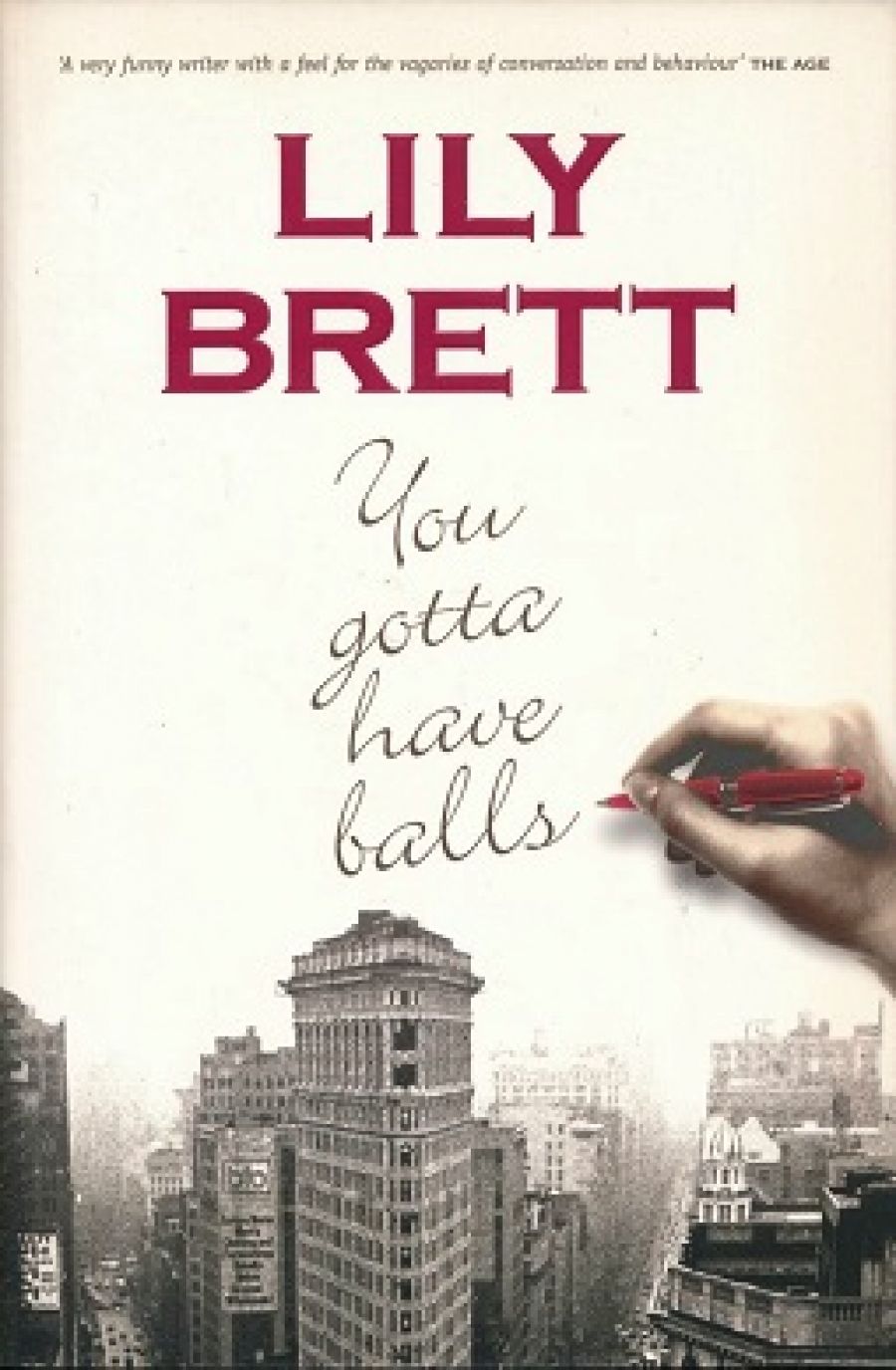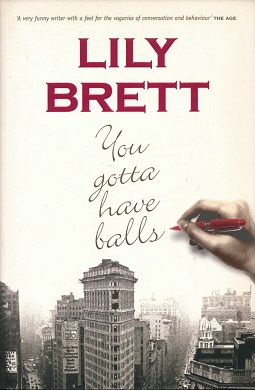
- Free Article: No
- Contents Category: Fiction
- Review Article: Yes
- Article Title: Too everything
- Online Only: No
- Custom Highlight Text:
Ruth Rothwax is back. The star of Lily Brett’s Too Many Men (2000) is still running a successful letter-writing business in New York City, but she’s branched out into greeting cards. Her father, Edek, with whom she made the trip to Poland in the earlier novel, has moved from Melbourne to New York to be near her. At the heart of the novel is the fraught, yet fond, relationship between them.
- Book 1 Title: You Gotta Have Balls
- Book 1 Biblio: Picador, $32.95 pb, 293 pp
- Book 1 Cover Small (400 x 600):

- Book 1 Cover (800 x 1200):

Ruth is learning how to survive in New York without her artist husband, who has gone to Australia on a long assignment. She likes her job, supports her Malapropian father (who puts himself in charge of the ‘Stockings Department’ in her business), and enjoys affectionate interactions with her three children. When Edek first comes to live in New York, he’s under her feet and she wonders how she will cope, but when he turns up at the office less often and is evasive about how he’s spending his time, Ruth becomes worried. As she tells Max, a work colleague, she’d never ‘mastered the category of concern. She had always slipped straight into worry.’
It is at this point that Zofia, notable for her large breasts, luminous clothes and the fling she had with Edek in Krakow, arrives from Poland. Of course, Ruth doesn’t like Zofia: ‘She found Zofia too everything.’ Although Ruth is relieved that her father’s time is better occupied and her business no longer oversupplied with useless items, such as a self-navigating vacuum cleaner, the fact that Zofia is Polish, not Jewish, significantly younger than the 87-year-old Edek and the source of unwelcome details about their sexual intimacies provokes a confusion of emotions in Ruth. How it is all resolved is embedded in the novel’s title.
Central to You Gotta Have Balls is the familiar Brettian theme of relationships: closeness with friends, love in marriage and getting older. The theme is captured in the text of the plain cards of different sizes, colours and textures that Ruth is now creating: ‘Divorce Has To Feel Like The End’, and on the inside, ‘It’s important to know that it is also a beginning’. And, ‘Don’t Be So Hard On Yourself’, followed by, ‘The only people who are not making mistakes are those who reside in an urn or a plot’. However, like the text in these cards, some of Brett’s reflections are too heavily invested with ‘meaningfulness’.
When Ruth muses about the differences between men and women, she claims that although she likes women, she doesn’t admire their aggression and competitiveness: ‘They can’t wait to join in and commiserate about how miserable you are. Want a lot of friends? Put on weight, get fired from your job, get cancer or maybe something less extreme like shingles or Bell’s palsy. Cancer can be very taxing on a friend.’ Ruth thinks that ‘the average severely depressed, semi-witted, half-lobotomised man is much smarter than most women’. Somewhat ingenuously, she says:
Men are so clear-headed. They know what they want. And they know how to get it. Their brains aren’t fogged and clouded and clogged with purposeless pursuits. They’re not filled with self-delusions of sweetness or notions of their own niceness or twelve different diet plans.
With such retro views about the differences between the sexes, it’s no wonder Ruth’s friends are leery about joining the Women’s Group that she is trying to form.
Less ambitious than Too Many Men, Brett’s latest concoction rarely moves beyond the world of relationships. Even when she mentions September 11, it is to make an observation about the interpersonal. Before that day, it was almost mandatory for New Yorkers to complain about the city: ‘about the noise, the traffic, the cost, the rush, the stress.’ But on September 11 the complaints disappeared: people looked heartbroken, you could see what people were feeling, you could see anguish and tenderness, you could see who people were. Brett is silent, however, on the global repercussions.
For those who seek some respite from the dark, mean and troubled times in which we live, Brett’s light and occasionally very funny novel will be welcome. Others may take comfort in the last third of the book, which has the familiarity of the Hollywood ‘Let’s put on a show’ genre, starring Edek, Zofia and Ruth instead of Judy Garland and Mickey Rooney. Ruth may proclaim early in the novel that men have it all, but by the end she’s coped without her husband much better than she ever thought she would, accepted the change in her relationship with her father, and begun to negotiate sustaining one with Zofia. It seems that you don’t have to have balls to manage rather well in New York City. But lots of money, avoidance of all things political and a sense of humour certainly help.


Comments powered by CComment